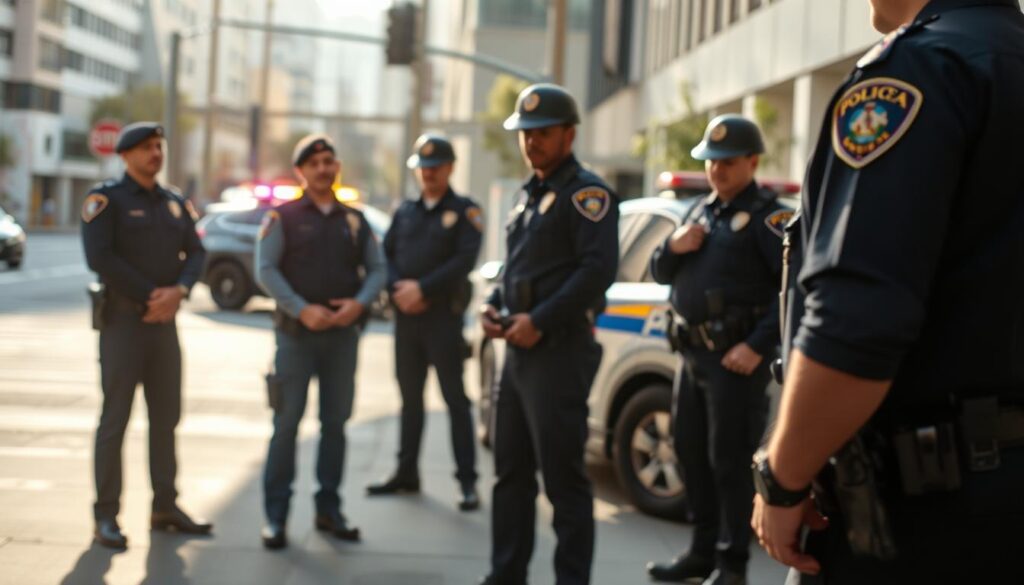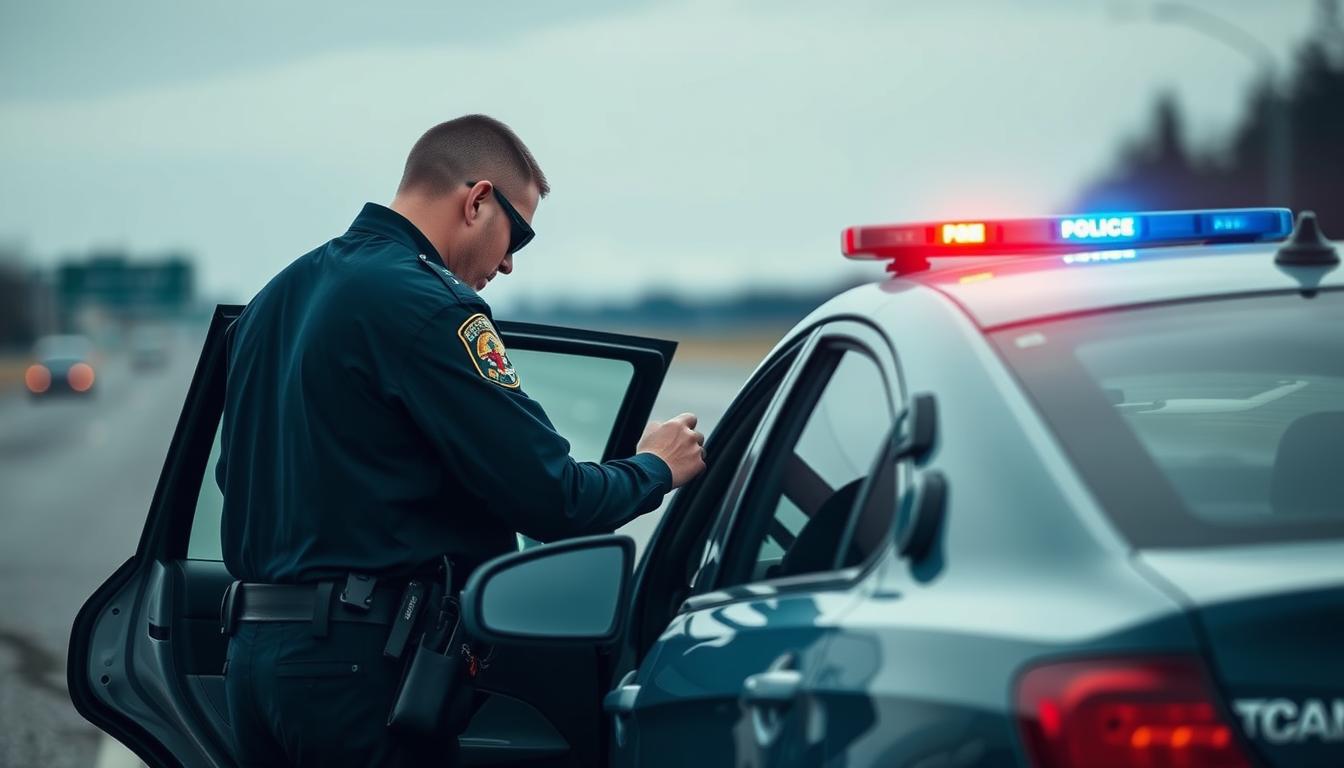Table of Contents
Did you know that over 70% of Canadians are unaware of their rights during a police vehicle search without a warrant? Understanding your rights is crucial in such situations, as it can significantly impact the outcome of the encounter.
Under Canadian law, police can conduct a vehicle search without a warrant if they have reasonable grounds to believe illegal items are present. However, these searches must adhere to strict legal protocols to ensure they don’t violate your rights under the Canadian Charter of Rights and Freedoms.
Striking a balance between public safety and individual rights is a cornerstone of our legal system. While police play a vital role in maintaining law and order, it’s equally important for citizens to understand when and how searches can be conducted without a warrant.
If you find yourself in such a situation, seeking legal expertise can provide clarity and guidance. Knowing your rights empowers you to navigate these encounters confidently and responsibly.
Understanding Your Rights During a Vehicle Search
Canadian law sets clear boundaries for searches to protect individual rights while maintaining public safety. For a search to be lawful, authorities must meet specific legal thresholds.
Legal Thresholds and Reasonable Grounds
A search can occur without a warrant if there are reasonable grounds to believe illegal items are present. This means authorities must have credible evidence, not just a suspicion. For example, if a driver is suspected of impaired driving, a roadside breath test may be administered.
Charter Rights and Individual Privacy
The Canadian Charter of Rights and Freedoms safeguards against unreasonable searches. Your right to privacy is protected, but it varies by location—highest at home, less in cars, and even less in public spaces like airports.
| Location | Expectation of Privacy |
|---|---|
| Home | Highest |
| Vehicle | Lower than home |
| Public Places | Lowest |
Passengers have less privacy than the vehicle’s owner. Learn more about your legal rights at https://sohi.law/crime-in-canada/.
Police Vehicle Search Without Warrant: Legal Perspectives
Understanding the legal framework surrounding searches is essential for both citizens and legal professionals. Canadian law distinguishes between searches conducted with a warrant and those based on consent or exigent circumstances. A warrantless search is permitted under specific conditions, such as when there are reasonable grounds to believe a crime has been committed.
Differences Between Warrant and Consent Searches
A warrant search requires judicial approval, ensuring that the search meets legal standards. In contrast, a consent search relies on voluntary agreement, which can be withdrawn at any time. Courts have emphasized that consent must be informed and freely given, without coercion.
When Authorities May Search Without a Warrant
Under the vehicle exception, authorities can search a car if they have probable cause to believe it contains evidence of a crime. This exception balances public safety with individual rights, allowing for immediate action in urgent situations. For instance, if a driver is suspected of impaired driving, a breath test may be administered without a warrant.
Relevant Case Examples
Courts have consistently upheld that warrantless searches must comply with strict legal standards. In a landmark case, the Supreme Court ruled that evidence obtained through an unlawful search could be excluded from trial, protecting individual rights under the Charter.

Evidence, Safety, and Security Considerations
Evidence handling and safety protocols are critical during vehicle searches to maintain legal integrity and public trust. These procedures ensure that any discovered evidence is preserved for legal proceedings while safeguarding everyone involved.
Handling Evidence in Vehicle Searches
When conducting a search, authorities follow strict protocols to secure evidence properly. This includes documenting every item found and storing it safely to prevent tampering. The goal is to maintain the integrity of the evidence for court cases.
Prioritizing Public and Officer Safety
Safety is a top priority during these searches. Officers are trained to identify potential threats, such as weapons, to protect both themselves and the public. Any dangerous items found are handled with care to prevent accidents.
Protecting property during a search is also important. Officers take steps to minimize damage to the vehicle and its contents. This balance between rigorous evidence collection and safety ensures that legal standards are upheld while respecting individual rights.
Learn more about your legal rights and how evidence is managed during searches by visiting https://sohi.law/theft-crimes/.

Navigating Consent and Unreasonable Search Seizure
Understanding when to give or refuse consent during a search is crucial for protecting your legal rights. In Canada, consent searches are legal, but they must be voluntary and informed. Refusing consent does not automatically imply guilt, but it can prevent potential legal complications.
When to Provide or Refuse Consent
A consent search occurs when you voluntarily allow authorities to search your property. However, it’s important to know your rights. You have the right to refuse a search if it is not authorized by a warrant or justified by exigent circumstances. If you feel pressured or unsure, it’s wise to seek legal advice before making a decision.
| Scenario | Recommended Action |
|---|---|
| Consent Request | Ask for clarification on the reason for the search. Refuse if unsure. |
| No Warrant | Politely decline unless there’s an immediate emergency. |
| Unclear Authority | Request identification and question the legal basis for the search. |
Refusing consent does not automatically imply guilt, but it can prevent potential legal complications. If authorities proceed without a valid reason, the search seizure may be deemed unreasonable, and any evidence obtained could be inadmissible in court. For more guidance, visit labourrightslaw.com.

Practical Steps During a Police Interaction
When interacting with law enforcement, staying calm and cooperative is crucial. This approach not only helps de-escalate tensions but also ensures your rights are protected. Remember, your behavior can significantly influence the outcome of the situation.
Staying Calm and Cooperative
It’s natural to feel anxious, but maintaining composure is key. Avoid sudden movements and keep your hands visible. Be polite and respectful, as this can prevent misunderstandings. Remember, your goal is to resolve the situation peacefully.
Documenting the Encounter
Documentation is vital for legal protection. If safe, record the interaction or take notes afterward. Include details like the officer’s name, badge number, and what was said or done. This evidence can be invaluable if you need to challenge the interaction in court.
Contacting Sohi Law Group
If you’re unsure of your rights or need legal advice, contact Sohi Law Group at 833-877-9797. Their expertise can guide you through the legal process and ensure your rights are upheld.

Understanding the process can significantly influence the encounter’s outcome. Stay informed, remain calm, and seek legal advice when needed. Visit Muscalaw for more insights on handling such situations.
Conclusion
In conclusion, understanding your rights during a search of your car is vital for protecting your freedoms under Canadian law. The legal system balances public safety with individual rights, ensuring that any search must meet specific thresholds. Reasonable grounds are essential for authorities to conduct such actions lawfully.
A search vehicle without proper justification can lead to serious legal consequences. Justice is best served when all actions align with established laws, safeguarding citizens’ rights. If you’re unsure about your rights or need guidance, consulting experts like the Sohi Law Group can provide clarity and support.
Reflecting on the information provided, it’s clear that knowing your rights empowers you to navigate such situations confidently. Remember, justice thrives when everyone adheres to legal standards, ensuring a fair process for all.





No comment